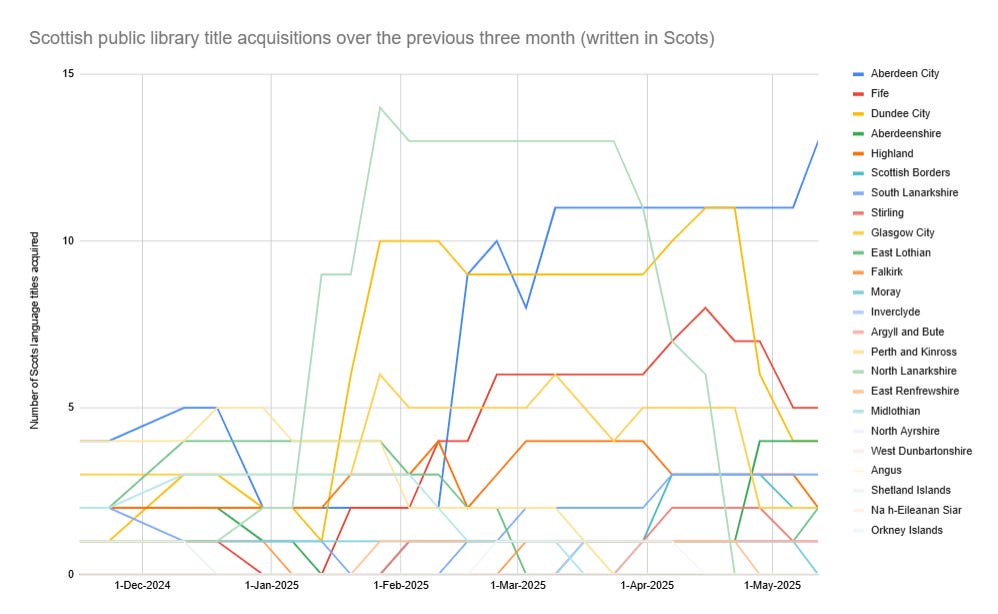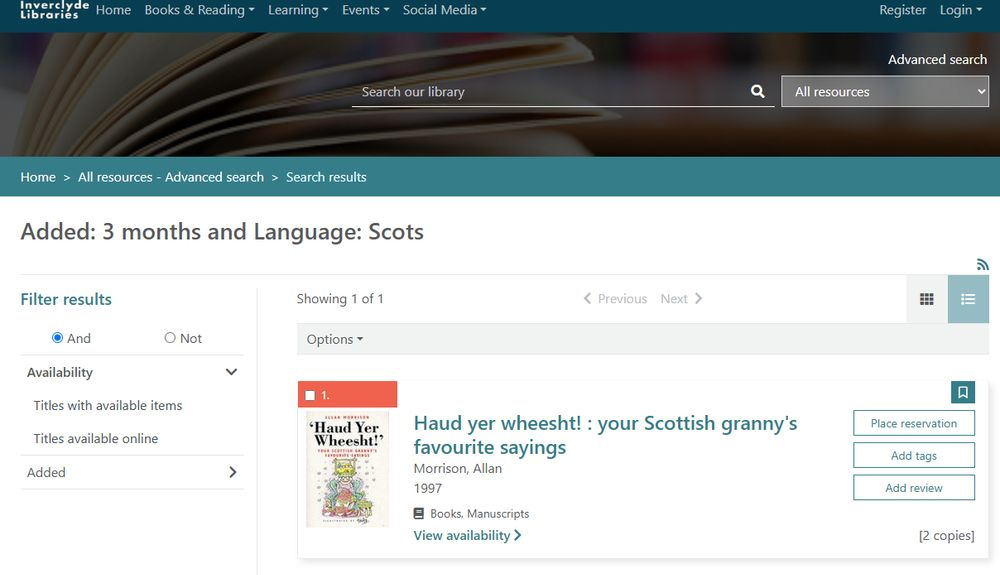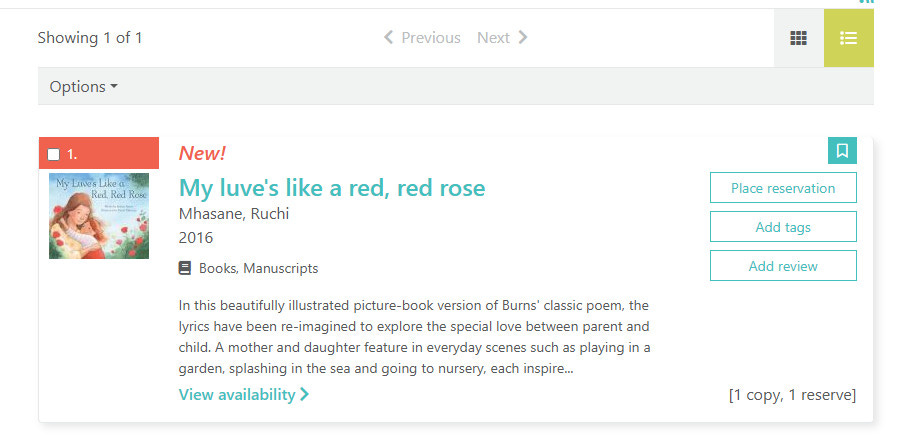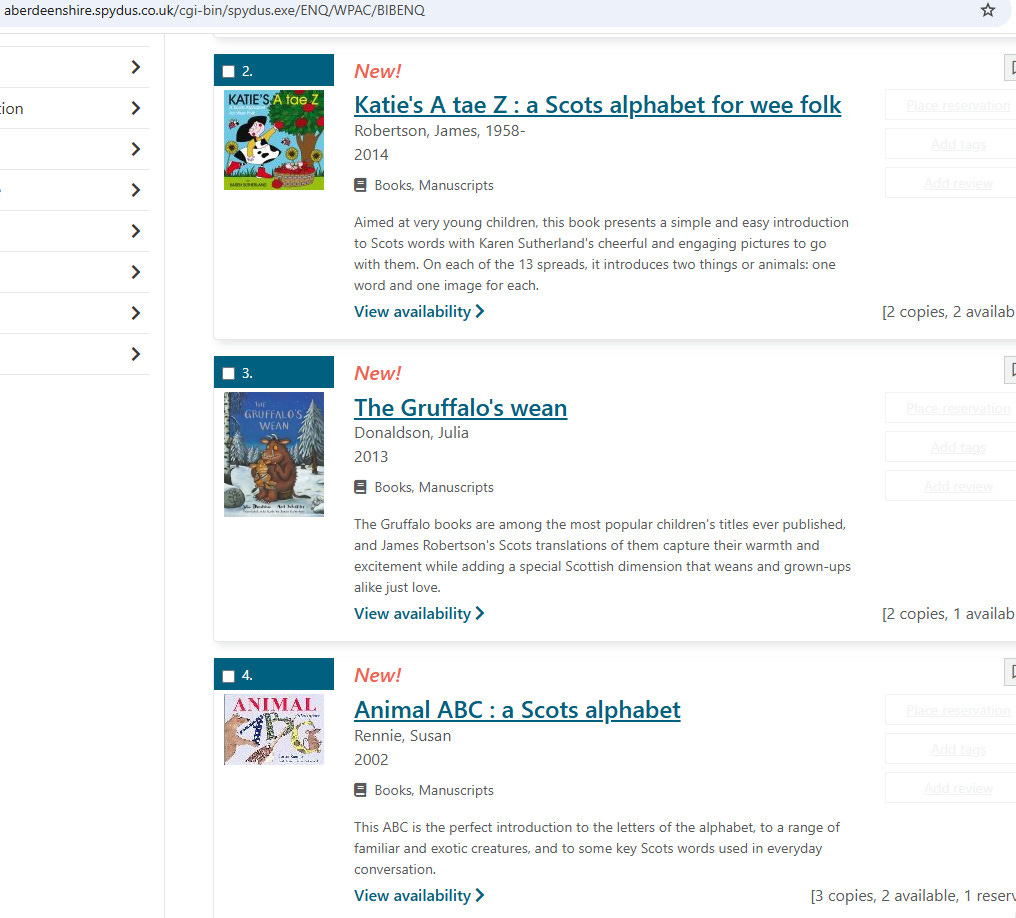Library acquisitions revisited
In which I deal with crippling self-doubt with a randomised control trial
I’m aware that not many people have the time or the interest in the sort of Scots language matters that I write about in this SubStack. Time is precious, and its unfair of me to take up too much of my reader’s time with this nonsense.
However, right now, there is a debate going on in Westminster Hall.
I apologise for Substack posts on consecutive days, I will try not to do this in future (unless asked).
Last year I noticed that Scottish public libraries only have very small selections of books written in Scots. The census reported that about 32% or one in three people consider themselves able to speak or read Scots, but the public libraries seem to have just one in two thousand books stocked are written in Scots, 0.06%.
It would be nice to have a “joined-up strategy that invests in libraries as platforms for opportunity, connection and growth” with out alienating Scots speakers.
Freedom of Information
I wasn’t sure if a simple library catalogue search was correct so I sent Freedom of Information requests through to twenty-two local authorities in Scotland to ask about their library acquisitions budgets.
After compiling the responses and extrapolating for the councils I didn’t contact, we can estimate that over the last three years (2021-ish to 2024-ish) they have spent a combined acquisitions budget of £5.2million each year on a total of 600,000 books, of which each year about 270 books in total are written in Scots (as recorded in the books library metadata).
This is the councils’ own figures, not my guess work.
270 divided by 600,000 is about 0.045% or less than one in two thousand.
We can conceptualise this as taking council tax money from Scots-speaking households and just handing all to English language publishers. Its unrepresentative and and literally shows the state oppressing the Scots language, and depriving Scots writers of income, harming and impoverishing them to some extent.
We can note that a number of local authorities have had years when they acquire zero books written in Scots, whilst managing to acquire tens of thousands of English language books.
In my living room, in Hertfordshire, I have a larger collection of Scots books than most Scottish local authorities, and I spend many times more of my hard-earned cash on Scots language books than most local authorities. The authors and publishers of Scotland make more money out of me than from local authority libraries.
Proportionate representation
If the local authorities were trying to make their book acquisitions representative of the linguistic breadth of their populations, then we might expect to see them spending £1,664,000 on Scots books each year, for around 200,000 books (which would dwarve the current estimate of 60,000 annual sales of Scots books from Amazon).
We should note there its possible I’m a whimsical fantasist with a weak grasp of reality. Maybe 32% of the budget and library stock in Scots isn’t realistic. Perhaps 20% is more realistic? Or 10%? 5%? 1%?
Maybe just some observable progress in the direction of bring more representative would be better than the current barrel-scraping doldrums.
Randomised Control Trial
What I did was I logged on to the Spydus library catalogue software for twenty or so library services and searched for the total number of book titles added in the last three months, and the number of Scots titles added in the same period.
And then repeated the exercise each week - to see how the number of acquisitions changes over time.
When we look at acquisitions in all languages, we can see that there’s a wide variety. Glasgow and Fife almost acquire more than 5,000 different titles over the previous three months. Angus, Shetland and Orkney are barely acquiring 500 titles - so its roughly in proportion to the population size (but not always).
We should note that it isn’t strictly determined by population, some local authorities value their libraries more highly than others. But this blog is about Scots language stuff, not general literacy.
We can also note that for some councils the acquisition volumes ebb and flow over the financial year, and others are more consistent month by month.
We can look at the specific number of Scots language titles acquired over the previous three months:-
Well done to Aberdeen City and Perth and Kinross, for acquiring up to five Scots titles (and two thousand or so English titles).
After a few weeks of collecting this data, I emailed a handful of library services, pointing out the proportion of Scots speakers / readers in their local authority area, and then suggested a list of books written in Scots published over the last two years, that they might want to consider acquiring if they have any book-buying budget left over at the end of the year.
Actually, I drafted two emails, a short concise one and a longer, more verbose one, packed with thrilling information about Scots speaking populations and library book stocks.
Anyways, here’s a graph showing how the number of Scots title acquisitions changed after I emailed a few library services.
We can see that before January, most libraries acquired not very many, and after January a couple of library services mysteriously decided to acquire three times as many Scots titles as usual.
I don’t want to claim all the credit for this change in behaviour, its probably just coincidence.
Vigilance
So every Monday, I rattle through the Spydus library catalogue websites, scribbling down numbers and observing which new books have been acquired.
And whilst I get a tiny dopamine hit when I see new titles, its kind of disappointing when rather than being “new” new, they are merely “old” new.
Here we see that Inverclyde acquired just one new title in May 2025, Allan Morrison’s “Haud Yer Wheesht!” published in 1997, almost thirty years ago.
Possibly ignoring all the great Scots books published in the last 25 years, in favour of whatever the supplier has in stock that they want to get rid of.
Its not just one library service that only acquires “old” new titles, its many of them.
Here a service acquired a “New!” title that was published 22 years ago:-
“New!” from nine years ago:-
“New!” from eleven, twelve and twenty three years ago:-
I would think this is disappointing for writers who are scrieving away today, the knowledge that it might be decades before libraries get round to stocking your Scots books.
Award-winning
Earlier this week the British Book Awards were held and announced that Len Pennie’s “poyums” poetry collection won the Book of the Year: Discover Award. The publisher Canongate’s decision to included both English and Scots poems in relatively equal measure seems to have been vindicated.
The book has been a best-seller both within the context of Scots language books and in the context of English poetry books on Amazon. And it won Book of the Year at the 2024 Scots Language Awards.
In the realm of Scottish libraries the book doesn’t often show in Scots language searches. But from searching for the specific title in each of the 32 regional library services we can see that the 493 individual libraries must share a total of 60 copies of this book. One copy to be shared between every eight branches.
The lack of this title demonstrates the ambivalence of Scottish librarian to the Scots language.
Readers and speakers
In the light of yesterday’s Substack article about people who can read Scots without speaking it and speak it without reading it, I feel obliged to reconsider my views on Scots books in public libraries.
The absence of Scots books doesn’t seem to be harming the educational prospects of people who can read Scots without speaking it. These people are disproportionately over-qualified compared to the rest of the population.
But its harder to say if the absence of Scots books in libraries has harmed the prospects of people who speak Scots without being able to read it. We can’t easily prove a negative, but can theorise that the lack of books in their language further alienates these people from education, and others them in their own lands.
This is a problem that only the public libraries can resolve - by asking their suppliers, Peters, and Askew and Holts, to more readily stock and supply books written in Scots in proportion to the regional language abilities, rather than forcing English books on everyone.
This shouldn’t be contentious. Libraries already have book buying budgets, paid for by Scots speakers. The funding already exists, its just being mis-spent.












Where you say you cannot "claim all the credit for this change in behaviour", I think you have identified the crux of the matter: libraries are influenced by what they are asked for.
What seems obvious to me, is that since Scots speakers and readers are almost certainly bilingual, they can read the plethora of books written in the English language and do not need to request books written in Scots. In fact, given that many Scots speakers are not readers of Scots, they might even prefer to read in English.
Therefore the reasons for requests are different, i.e. to support Scots writers and publishers, to promote and protect the language, not because they want to read a particular title, or need to obtain information on a particular subject.
I don't know if it is the same in Scotland, but in England there are two aspects to library acquisition: the purchase of books from the publisher, and interlibrary loan. My understanding is that the British Library hold every single book ever printed (unless this is apocryphal), and therefore every library can order whatever book you want. In my local library down there, I have to complete a form. How quickly it is obtained will depend on whether it is stocked by another Devon County Council library, or has to come further - and of course how many copies there are overall, and whether they happen to be on loan.
I imagine that if enough people request a title that the library will 'get' that they need to purchase a copy for themselves. Or we can assume that if enough people like yourself ask them to stock Scots language books, they will do so.
But how many proponents of Scots language books do so?
Cathy
Guid wark!